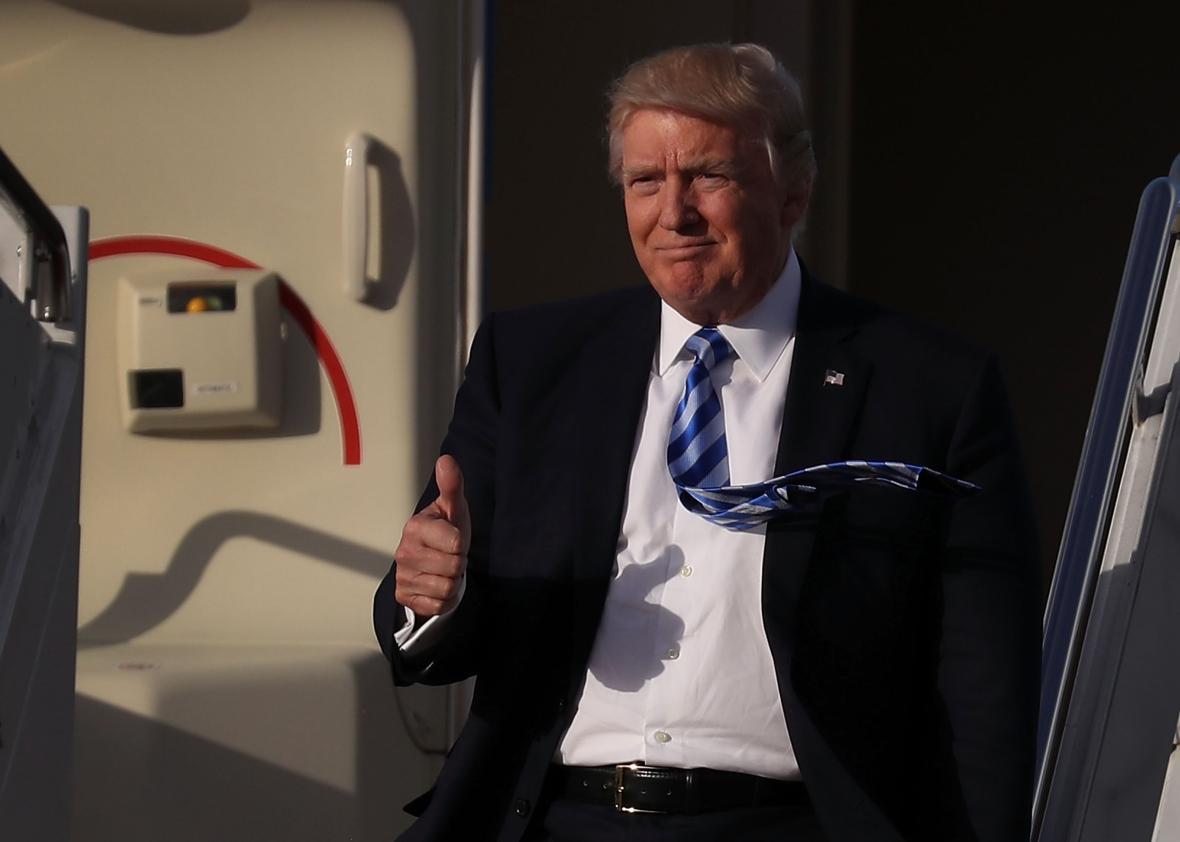The first-quarter GDP report, which came out this morning, landed like a wet blanket on the eve of Donald Trump’s 100th day in office. The economy expanded at an anemic .7 percent rate in the first quarter, sharply below the 2.1 percent annual rate of the fourth quarter.
Let’s be clear: The lame report isn’t President Trump’s fault, by any stretch of the imagination. As many analysts have noted, the first quarter has been a problematic one for growth for the last several years, likely due to some persistent issues in the way the government measures growth. But it should also give the lie to the sentiment’ broadly held among businesspeople and the right—that Trump’s inauguration would lift the heavy blanket that had been holding down economic growth, unleash animal spirits, and lead to a boom.
That’s been the message that has been pouring forth for months from the usual suspects—many analysts on CNBC, Fox News, the Wall Street Journal editorial page. It’s an article of faith among Republicans that the economy can’t grow when Democrats are in charge and that it automatically shifts into a higher gear when Republicans assume the reins. Given the performance of the markets and the economy over the past 25 years, there’s no reason to think this. Yet it remains remarkably powerful. Earlier this week, Scott McNealy, the former CEO of Sun Microsystems, said the economic “waterboarding” has stopped.
This sense of relief and euphoria over unitary Republican control accounted for the Trump Bump—the surge in the (forward-looking) stock market since inauguration. It was also behind other significant shifts in sentiments. Many of these are the results of Republicans, and Republican-leaning businesspeople who were congenitally dissatisfied while the economy grew and the stock market tripled under Obama, suddenly feeling sunnier.
To wit: The homebuilders sentiment index spiked. Gallup’s measure of economic confidence, in negative territory for much of the past eight years, flipped into positive territory immediately after Election Day. Consumer confidence rose to levels not seen since the height of the dotcom boom. It’s not because things got so much better or the actual circumstances for homebuilders or consumers changed overnight. Rather, it’s because Republicans, who were irrationally pessimistic about the direction of the country and the economy during the Obama years, overnight became irrationally optimistic. And because Democrats and independents haven’t responded by becoming symmetrically negative, the indexes have all shot higher.
The reality, of course, is that this isn’t the way a $19 trillion economy works. It doesn’t change its mind about how fast it wants to grow based on who is sitting in the Oval Office. June will mark the eighth year of this expansion, which has been marked by slow and steady growth. The monthly data that helps guide those who make estimates on broad economic growth—car sales, home sales, job growth, retail spending—didn’t take a collective dose of Viagra in November.
This has opened up a wide gulf between the soft data—sentiment, confidence levels, what people tell you about how the feel about the economy—and the hard data, which shows what actually happened in the economy. In fact, there are signs that just as sentiment was firming up, the actual data was wilting. The Atlanta Federal Reserve maintains GDP Now, a snapshot of how it thinks the economy is doing in the present (or most recent) quarter that is continually updated as new data points come in. In late January, GDP Now was forecasting that the economy would grow at a 2.4 percent annual rate in the first quarter. But over the course of February, March, and April—the first full months of Trump’s term—the hard data that came in was worse than expected.
This doesn’t mean the economy is headed for recession, or that businesses have decided to stop investing because they’re freaked out by the rampant uncertainty, or that consumers have stopped spending as an act of resistance. By many measures, in fact, the economy is doing quite well, chugging along toward its 95th month of expansion. It’s just that the Trump economic boom, like the Trump presidency, is a lot of bluster—with not much action to back it up.
